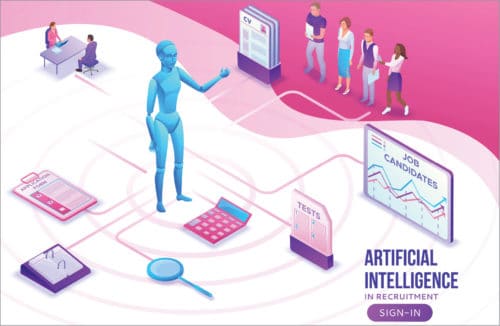In general, human resource (HR) services include a large amount of time spent on standard onboarding processes for new employees, triaging common questions and employee requests, and basic benefits management. Artificial intelligence (AI) presents an opportunity for HR to automate repetitive, low-value tasks and to increase focus on more strategic work

Corporate India is going through a defining time, with emerging technologies taking over many areas of business. Human resource (HR) is one such critical area, which is core to any business and has been going through rounds of revolution and transformation, both in terms of processes and technology.
Artificial intelligence (AI) happens to be the newest kid on the block. It is taking recruitment processes by storm, as it is getting re-engineered every day, with more and more intelligent and repetitive work being replaced by AI. Let us look at some key areas where AI is being used to empower workforce.
Removing bias
Unconscious bias is a huge challenge that all corporates are trying to fight. Corporate India is no exception. Conscious bias is easier to tackle, but unconscious bias creeps in in the most unexpected ways. It can not only influence the choice of a candidate at the time of interview but also the job description itself, making it a far more pervasive problem. AI can easily be used to remove this unconscious bias.
Evaluating profiles and conducting first-level interviews
Today, sourcers and recruiters are spending a considerable amount of time in scanning, evaluating and shortlisting profiles, and doing first-level interviews. Outcome is often subjective as it is based on emotional state of the recruiter(s). AI can take over these repetitive jobs, bring more objectivity and complete these tasks much faster.
There are quite a few AI-based platforms in the market today.According to a report by Forrester, by 2020, candidates applying to jobs at twenty per cent of the large global enterprises will interact with chatbots before recruiters.
Improving employee onboarding experience
Employee onboarding is the employee’s first experience with an organisation, and it is the organisation’s best opportunity to create an excellent first impression. Today, due to resource crunch and subjectivity associated with people, onboarding experience has become random and unstandardised. Using AI effectively can help a new employee navigate his or her way into an organisation seamlessly, and have an excellent onboarding experience.
Identifying customised training requirements for employees
Mostly, people become redundant within an organisation because they lack relevant skills. But if they can be trained in a timely fashion, the organisation can utilise existing staff, without having to retrench and hire new employees. AI can be used effectively to match existing talent with the required ones, and identify the gaps in skillsets. It can also do a fitment of who is best trained on which required skill(s).
Managing resources
People-intensive businesses have a huge challenge of finding the right skilled people internally at the right time, and often end up hiring people at a higher cost, when an equally skilled person is available within the company. AI can help with this function and in a very time-effective manner, thus reducing the cost of hiring, training and keeping a skilled resource on the bench.
Identifying people who are looking out
Losing trained and experienced employees to competition is a huge loss to any organisation. AI can track employees’ keystroke patterns, idle times and Internet-browsing patterns, and predict whether they are looking for newer opportunities.
Smarter and better people analytics
AI-enabled employee analytics provide necessary insights to ensure better employee experience. It ensures meaningful employee engagement, which makes employees happier and increases retention.
These are only a few core functions that AI can carry out immediately. However, there still exists a degree of apprehension among the HR fraternity to totally embrace AI. AI today is not just efficient, it is also inexpensive. One word of caution, though; it is imperative that recruitment processes are reviewed and re-engineered to remove age-old practices and made well-suited for reaping maximum benefits out of AI.
Research from PwC shows that 63 per cent of companies are rethinking the whole role of their HR department in light of the impact AI will have on their business. Thanks to AI and robotic process automation (RPA), HR experts will now be able to focus on core areas, which cannot be done by any technology. AI can help build a high-performance HR team and, as a result, a high-performance workforce.
Mohua Sengupta is executive vice president and global head of IT services, 3i Infotech.






